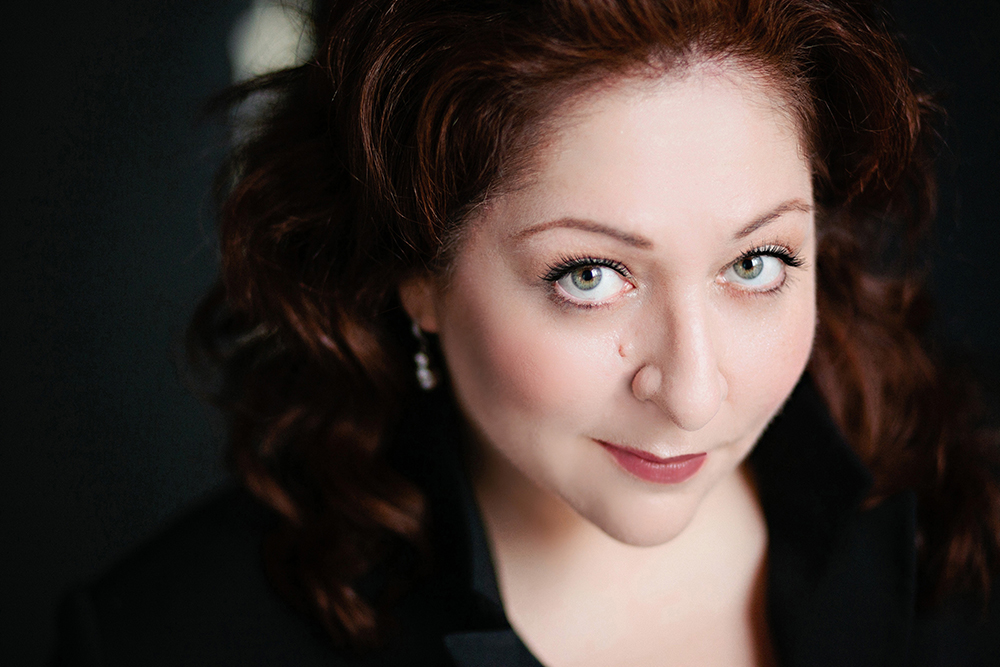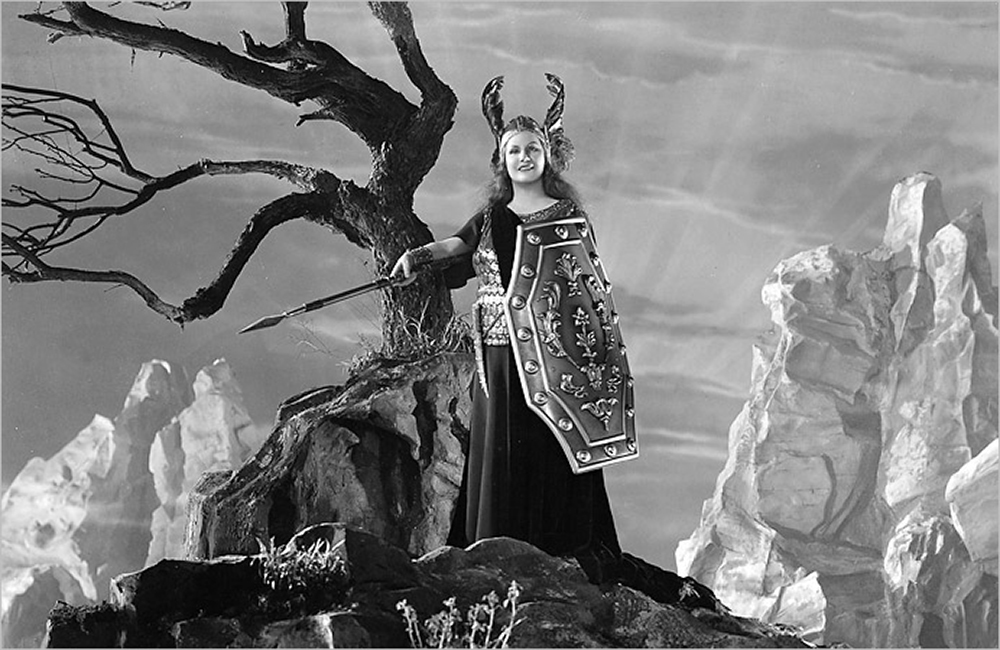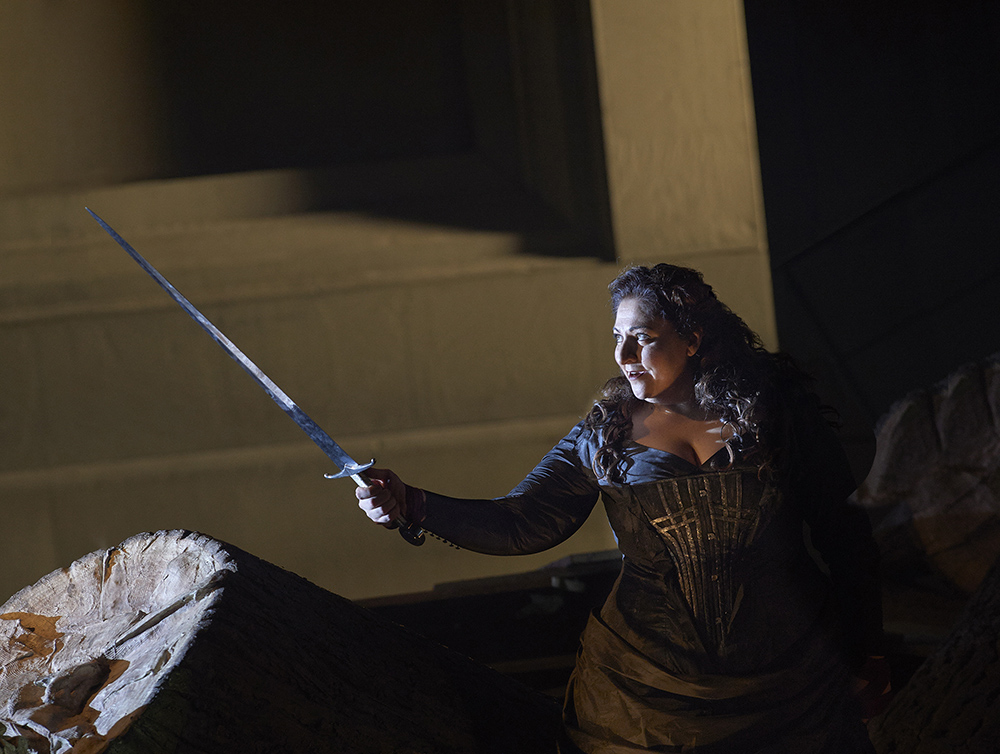
Those who have met and/or worked with the American dramatic soprano, Christine Goerke describe her as “fun to be with”, “unassuming”, “down to earth”, “hard-working”, “a real charmer” – the furthest one can get from your stereotypical, card-carrying Valkyrie.
Musical America has named Goerke, Vocalist of the Year 2015, citing that she is “the Wagner-Strauss soprano we have been waiting for, a multi-hued miracle of gale-force power, and pinpoint control, effortlessly riding over the most clamoring orchestras.”
Although she sang her first Ring Cycles in New Zealand last season, they were ‘in concert’ only – no sets and no costumes. She is currently in Toronto for her first staged Cycle with the Canadian Opera Company – starting with seven performances of Die Walküre. She returns the next season for performances of Siegfried, and season after that for Die Götterdämmerung.
****
“Leave Wagner Alone!”

These are the three words that the great Wagnerian soprano, Kirsten Flagstad, offered young singers when asked for her advice about singing Wagner. Wagnerian sopranos are much in demand, but given the vocal challenges of Wagner’s music, good ones are always in short supply.
So while the temptation to enroll in the Valhalla School for Valkyries is great, it could lead to a dramatically shortened career. [Flagstad once said that to be a successful Wagner singer that one needed a perfectly placed voice, absolute control of the breath, and immense staying power. Birgit Nilsson added, “and a good pair of shoes.”]
Today, when we look back on Flagstad’s career (she died in 1962), most of us can only conjure up memories of her great studio and broadcast recordings of Wagner: notably Isolde and the three Ring Brünnhildes. But apart from that it would appear that the Norwegian soprano had stepped, fully formed – like Athena from the head of Zeus – trumpeting Wagner! Nothing is further from the truth.
Flagstad made her debut in 1913 at the age of 18 and for the next two decades of her career, she sang as a lyric soprano, singing everything from Mozart’s Magic Flute (first lady) and the title role in Handel’s Rodelinda, to Maguerite in Gounod’s Faust – plus a lot of operetta. Only gradually did she make the move to early Wagner, such as Eva in Die Meistersinger (in 1929) and Elsa in Lohengrin (in 1930). She did not sing her first Isolde until 1932 – a month before her 37th birthday. But from then on it was mostly Wagner, Wagner, Wagner… Flagstad, for example, sang 182 performances of Isolde throughout her career – with over 100 of these at the Metropolitan Opera alone.
Christine Goerke’s career path has not been dissimilar to that of Flagstad. She started off as a lyric coloratura soprano, singing Handel and Mozart. She never dreamt that one day she would be donning a winged helmet and brandishing a spear as Brünnhilde.
When some prescient individual suggested to Goerke that one day she would be a dramatic soprano, her teacher said, “at 24 you are not anything of the kind. So put your fingers in your ears and stick with Mozart. In 10 or 15 years,” she said, “who knows. But today? No!” From Goerke’s point of view, her teacher’s words of caution were perfectly fine, as she was having too much fun singing Handel and Mozart. “I loved singing Mozart and I loved singing Handel and I remember when the last chord sounded on the last Handel piece that I was going to sing, I came off the stage and burst into tears. I felt like I had lost my best friend.”
But in her early 30s, things suddenly started to change vocally. “Things felt wrong,” says Goerke, ” and I had no idea what was going on. From what I had read about ‘big’ voices, I thought that there would be a change coming eventually. But it was supposed to happen later—in my late 30s, early 40s. But I was only 32 (the same age as Flagstad when she sang her first Isolde.) and I couldn’t figure out what was going on.” Goerke admits that she nearly gave up singing out of frustration, but she persevered, changed voice teachers, adjusted her technique and the rest is history.
There is no magic number for when you can start singing this repertoire. It really does vary from person to person. When it’s time, it’s time. You have to pay attention to your instrument… to your body… and whereas my voice started changing at 32, for others it will happen at another time. There’s no magic number. And because I was supporting for a lyric coloratura sound – not a dramatic sound, it was as simple as changing my support, to get underneath all the rest of this sound that was in there that I wasn’t using.
New York Times critic, Harold Schonberg, wrote in Flagstad’s obituary that her “voice was enormous, but it did not sound enormous because it was never pushed or out of placement.” This is something that Goerke clearly understands. “Since Wagner was such a bel canto fan,” Goerke says, “you have to approach all the lines that way, and sing it as if it were Bellini’s Norma. It can’t be yelled. None of it can.”
In 1994 while in the Metropolitan Opera’s Lindemann Young Artists Development Program, Goerke was Deborah Voigt’s understudy for Robert Wilson’s new production of Lohengrin with Canadian tenor, Ben Heppner, staring in the title role. “It was my first major Wagner contract,” says Goerke. ” And during the rehearsals, I watched Ben like a hawk. I don’t know that I’ve ever seen such a smart singer. That man never sang anything except with his voice, with his instrument, with his capabilities, and he never pretended to be something that he wasn’t. It was a beautiful experience.”

When asked about what qualities she looks for in the role of Brünnhilde, Goerke says, “It really depends upon which Ring opera you are talking about. With the Walküre Brünnhilde I need to hear strength, but I also want to hear youth, and I want to hear sparkle and I want to hear innocence. And in the Siegfried Brünnhilde there has to be sadness and a discovery of passion. And there has to be a continuation of all of this, as she becomes more human and experiences more emotions as the cycle goes on. So by the time you arrive at the end of Götterdämmerung, you’ve been through every colour that your voice can possibly produce and every emotion that your body is capable of.”
In preparing a role, some singers admit that they listen to absolutely everything they can find on CD or DVD. It’s a quick way to learn a piece.
I try not to, but it’s difficult because at some point you actually need to listen to recordings. I try not to because I’m a terrible mimic. I don’t realize that I’m doing it, but I get so excited about certain things and then I think, ‘Oh, that sounds good. I’ll try to do that.’ “But in this repertoire, you cannot try to do anything that someone else has done. You need to do it with your own instrument and know what your strengths are and how to negotiate with your voice. That said, at some point I need to listen to recordings to study the orchestration. And in that case I try to find a voice that is the least like mine. Like Hildegard Behrens (of course there’s not the least bit of a chance that I could ever sound like that!). She’s wonderful and it’s a very different interpretation and a very different colour than mine. It’s also a very lean, cutting sound. For me I love Behrens for Walküre especially because it’s such a youthful sound. She sounds like a young girl.
Many Brunnhildes often sing the role of Sieglinde before tackling her big half-sister. “I have covered Sieglinde three times,” says Goerke, “but I’ve never gotten to sing her. Unfortunately we are no longer in the time that people switch back and forth – although I would love to. So if anyone would hire me for Sieglinde I would love to sing it, but I fear that I am firmly planted in Wotan’s other daughter’s land.”
And Tristan und Isolde?
It’s funny you should ask, as I have the score with me here. I am now actually getting it learned and committing it to memory. I’ve been taking forever to learn it. The first time I opened the score and went through it, I ran out of highlighter – which scared me so much that I put it away! And then I opened it again, and said, ‘Be a big girl and start working on it.’ And as Isolde is angry for a really, really long time, I put it away again. But I have a friend who sings Isolde who said to me, ‘You need to stay calm and get to Act II. You’ll feel a lot better.
As our interview ended, I asked her if she had any favourite moments in Die Walküre?
I have yet to make it through the final scene without bursting into tears. I’ve had to apologize a hundred times already. Thank god I’ve finished singing by that point. What’s funny about that last scene (between father and daughter) is… well, as you know, this is not the most traditional of families, so they don’t have the most healthy familial relationships. But that last scene is about as sexy as you can get without actually having a sexy scene. There is so much emotion. I love it.
For recreational listening, Goerke’s “hero” is the great dramatic soprano Astrid Varnay. On the more popular front, she turns to Earth, Wind and Fire, Billy Joel, Bruno Mars… “and I really like Queen,” she says, “I think that Freddy Mercury might have been one of the greatest singers – ever – in the history of singing.
- THE VOICE | Renée Fleming Turns Gold at Roy Thomson Hall - November 7, 2015
- THE SCOOP | Glenn Gould: Celebrating Genius with Cupcakes - September 28, 2015
- SCRUTINY | The Rebirth of R. Murray Schafer’s Apocalypsis - June 30, 2015



